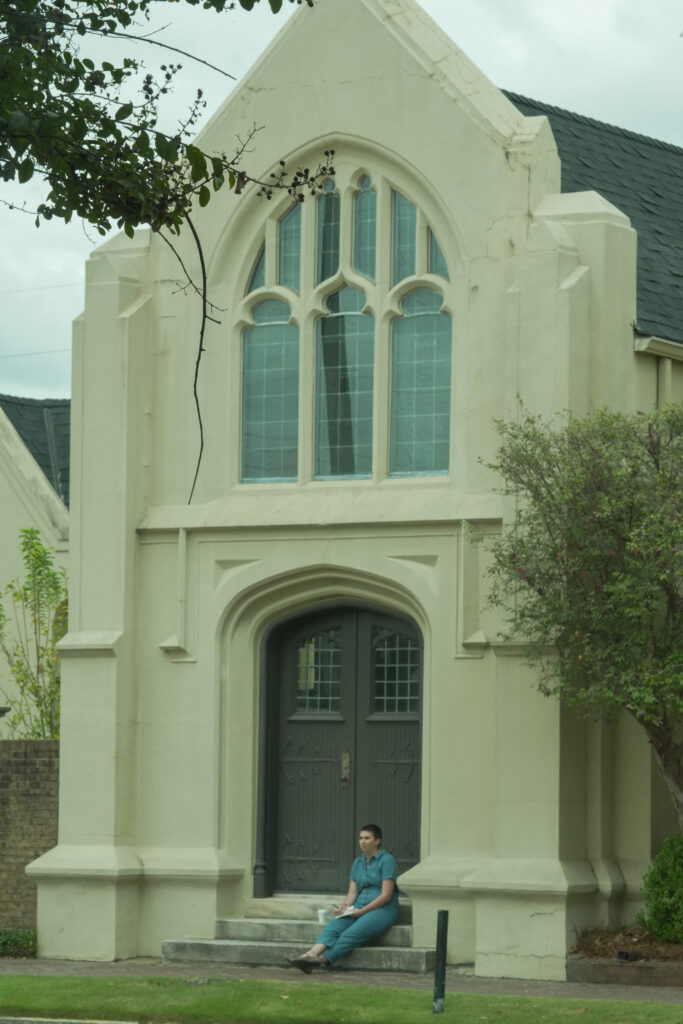In November 2024, days after the Presidential election, I traveled with Arrabon to Montgomery, Alabama. I visited the Equal Justice Initiative’s Legacy Sites and toured historic markers throughout the city, including where the infamous bus boycott took place for over a year. The following reflection came about as a result of my experience.

A facade is “an outward appearance that is maintained to conceal a less pleasant or creditable reality.”
I walked through Montgomery today noticing the world around me. I felt the breeze blowing on my face and the warmth of the sun on my skin, interrupted by occasional clouds. I heard the dried leaves scraping the road as they blew by. And I witnessed little ants marching, scurrying back and forth along the sidewalk.
It was peaceful. Simple. I can close my eyes and return right back to that moment, sitting on the steps of a local church, experiencing the sights and sounds of Montgomery’s streets.
I sat and admired the beauty of God’s creation around me, taking it in with all my senses. Being in nature, and in creation, is one of the primary ways I connect with God.
Then a loud car drove by, and I became more attuned to the things around me that man created.
I noticed the city garbage cans nearby, imprinted with the words “capital of dreams.” Hmmm. Whose dreams?
I heard the idling of a tour bus. But although “idle” is the correct word, it doesn’t really describe what it sounded like. It was a deep, intimidating rumble. It even sounded hot, like if I was closer I would experience it more than just audibly.
After it being parked for a long time, at least ten minutes, the bus drove away and left behind an indescribably noticeable silence.
Taking the sound of this bus away made room for every other sound to be heard more fully. The leaves still scraping the sidewalk, the cars still driving by, and new sounds, like voices of passersby, welders constructing, and a train whistle.
The absence of this one sound made all the others louder. A facade, then, is perhaps a sound “that is maintained to conceal a less pleasant or creditable reality.”
But there was still something I couldn’t hear, no matter how closely I listened–footsteps.
As men and women walked all around me, their voices now carried to my ears, but the sound of their feet hitting the pavement did not. Isn’t it interesting that I could hear the scraping of dried leaves, something that weighs almost nothing, but not of footsteps of men and women who not only carry weight, but force?
In the same location where decades ago Montgomery’s buses idled probably louder than this one, waiting for silent footsteps to enter into them.
But they didn’t. These feet kept silently to themselves on the sidewalks instead, boycotting the intimating, loud engines.
A facade is “an outward appearance” –or sound– “that is maintained to conceal a less pleasant or creditable reality.”
What realities are currently being concealed by the things we deem more desirable?
The beauty of creation is one of the primary ways I connect with God. But only desirable creation, like mountains and beaches and trees and birds and dogs. Sometimes cats. Not mold or mosquitoes.
But what about people? Can I honestly say I connect with God through creation when the people who have done so much harm in this city are God’s creation, too?
A facade is “an outward appearance” –or sound– “that is maintained to conceal a less pleasant or creditable reality.”
While listening to the noises of Montgomery’s streets, and in remembering these sounds now, I wonder what truths are being concealed here because they are less pleasant than the reality?
It’s not about the buses.
It’s not about the silent footsteps.
It’s about God making Godself available,
noticeable,
and accessible,
in all of creation,
to all of creation,
without hindrance,
without caveat,
without a facade.
Can God be known or trusted without a facade?
Helpful Links:
